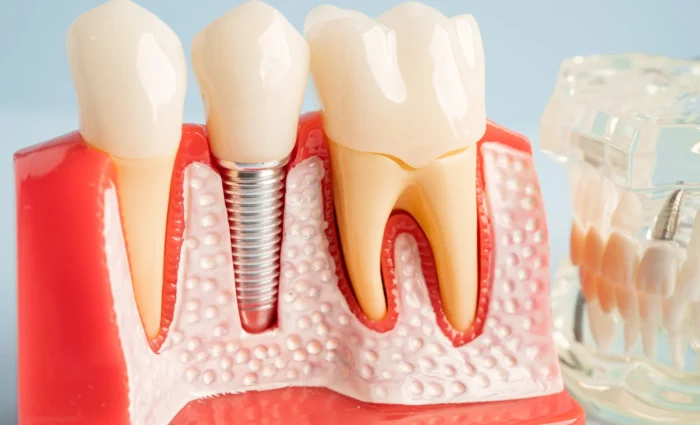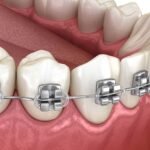What Are Dental Implants?
A dental implant is a titanium post or frame that is surgically placed into the jawbone beneath the gum line. These implants act as anchors for artificial teeth, such as crowns, bridges, or dentures. The implant fuses with the jawbone in a process called osseointegration, providing a secure foundation for replacement teeth.
Types of Dental Implants
- Endosteal Implants: The most common type of implant, placed directly into the jawbone.
- Subperiosteal Implants: Placed on top of the jawbone, under the gum tissue, used for patients who do not have sufficient bone height for endosteal implants.
- Zygomatic Implants: Placed in the cheekbone (zygoma) and are used when there is insufficient jawbone in the upper jaw.
Benefits of Dental Implants
- Permanent Solution: Unlike dentures or bridges, implants are a permanent and stable solution.
- Natural Look: Implants are designed to look and feel like your natural teeth.
- Improved Speech: With no slipping or shifting, implants allow for improved speech, unlike dentures.
- Better Chewing Function: Implants provide full chewing power, allowing you to eat a wider variety of foods.
- Bone Health Preservation: Implants help prevent bone loss, as they stimulate the jawbone just like natural teeth.
- Improved Confidence: Since implants are permanent and natural-looking, they can enhance your self-esteem and smile.
The Dental Implant Procedure
- Initial Consultation: The dentist will assess your oral health, take X-rays, and develop a treatment plan. The bone structure of your jaw will be evaluated to ensure it can support the implant.
- Surgical Placement of Implant: Under local anesthesia, the implant is surgically placed into the jawbone.
- Healing Period (Osseointegration): The implant needs to fuse with the jawbone. This can take anywhere from 3 to 6 months.
- Attachment of Abutment: Once osseointegration is complete, a small connector called an abutment is attached to the implant.
- Placement of Crown/Bridge/Denture: After the gum tissue heals, a custom-made crown, bridge, or denture is placed on the abutment.
How Long Do Dental Implants Last?
With proper care and maintenance, dental implants can last 20-25 years or longer. Their longevity depends on factors like oral hygiene, the patient’s overall health, and the expertise of the dentist performing the procedure.
Who is Eligible for Dental Implants?
Most healthy adults are candidates for dental implants, but certain conditions may affect eligibility, including:
- Adequate Bone Density: Sufficient bone is required to support the implant.
- Healthy Gums: Gum disease must be treated before proceeding with implants.
- Good Overall Health: Conditions like uncontrolled diabetes or smoking can negatively impact the success of the implants.
Who is Not a Candidate for Dental Implants?
- Individuals with severe gum disease
- Those with insufficient bone mass in the jaw (though bone grafting can sometimes help)
- People with chronic conditions that may affect healing (e.g., cancer, uncontrolled diabetes)
How Painful is the Dental Implant Procedure?
The procedure itself is generally not painful because local anesthesia is used to numb the area. Post-surgery discomfort is minimal and can be managed with over-the-counter painkillers. Any swelling or discomfort usually resolves within a few days.
Potential Risks and Complications
Although rare, risks include:
- Infection: Infection can occur at the implant site if proper aftercare isn’t followed.
- Implant Failure: This can happen if the implant does not fuse with the jawbone properly.
- Nerve Damage: If the implant is placed incorrectly, it can affect nearby nerves.
- Bone Loss: Failure of osseointegration can lead to bone loss around the implant.
Caring for Dental Implants
- Oral Hygiene: Brush and floss regularly to prevent gum disease and infection around the implant.
- Regular Dental Checkups: Regular visits to the dentist are essential for monitoring the health of your implants and surrounding tissues.
- Avoid Hard Foods: For the first few days after placement, avoid hard foods that might affect the healing process.
- Quit Smoking: Smoking can affect healing and the success of the implant.
Dental Implant Costs
The cost of dental implants can vary significantly based on factors such as the number of implants, location, and the clinic you visit. On average, the cost of a single dental implant in the UAE ranges from AED 4,000 to AED 15,000. Additional costs may include the abutment, crown, and any preparatory procedures (e.g., bone grafting).
Alternatives to Dental Implants
If dental implants are not suitable, other options include:
- Dentures: Removable false teeth for replacing missing teeth.
- Dental Bridges: Fixed prosthetics that bridge the gap created by missing teeth.
- Partial Dentures: A removable appliance for replacing a few missing teeth.
Dental Implant Aftercare
- Rest and Recovery: After the implant surgery, take some time to rest and avoid strenuous activities.
- Diet: Stick to soft foods like soups, mashed potatoes, or smoothies in the first few days.
- Follow-Up Appointments: Ensure you attend all follow-up appointments to check the healing process.
Advancements in Dental Implants
- Same-Day Implants: In some cases, implants and crowns can be placed in one visit, offering convenience for patients.
- Mini Implants: These are smaller than traditional implants and can be a solution for patients with limited bone volume.
- 3D Imaging: Modern technology, like 3D imaging and computer-guided surgery, improves the accuracy of implant placement.
Choosing a Dentist for Dental Implants
When selecting a dentist for dental implants:
- Experience and Expertise: Choose a qualified oral surgeon or implant specialist with experience in implant procedures.
- Clinic Reviews: Read reviews and testimonials from past patients.
- Consultation: Have an initial consultation to assess your eligibility and discuss the treatment process.





